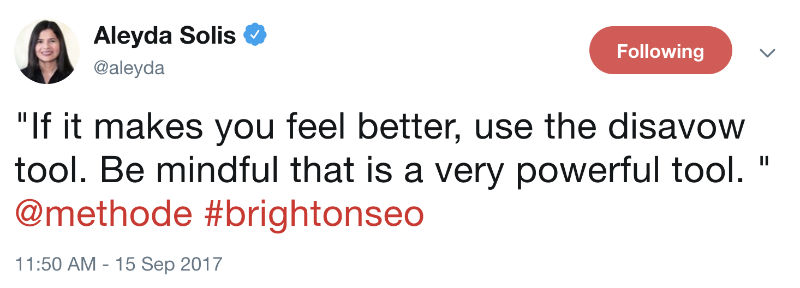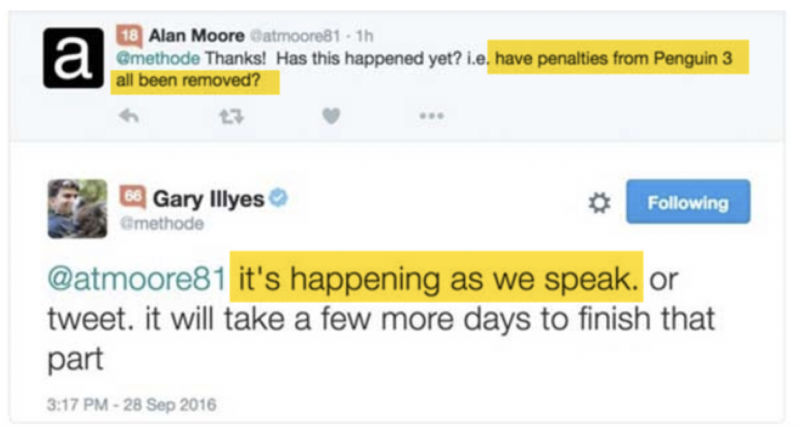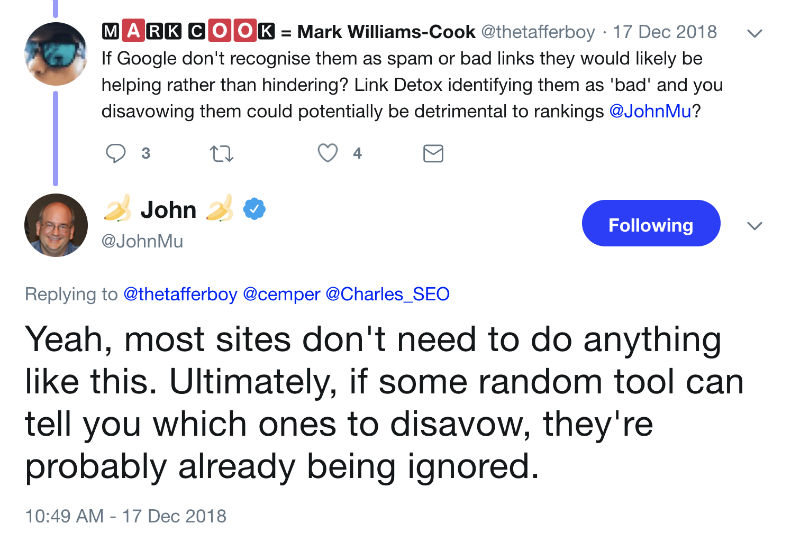Last Updated: February 28, 2019
Are you trying to decide on whether or not you should submit a disavow file to Google? There is a lot of confusing information available online. In this article, we will explain our current thoughts on auditing links and filing a disavow with Google.
Note: This article contains our disavow advice for 2019. For our most current recommendations on disavowing, please read MHC's Annual Report on disavowing links.
Why are we qualified to write this article?
For many years now, Marie Haynes has been considered one of the most authoritative in the business when it comes to the subject of understanding how Google deals with Unnatural links. She has written a book about Google’s manual unnatural links actions which covers link auditing in great detail. Many SEOs who offer link audit services these days, learned from this book. She also regularly speaks at conferences like SMX and Pubcon and has been quoted in authoritative sources such as Forbes, Search Engine Round Table, Moz and Search Engine Land. Marie and her team have audited links for hundreds of websites and in many cases has helped these sites see fantastic improvements in rankings and traffic. Our most recent fun project is our entry into the Wix SEO competition
Why does Google care so much about links?
Early search engines were not that great. When Google first came on the scene, people quickly noticed that the results of their searches returned much more accurate results than the other options such as Lycos, Ask Jeeves and Yahoo! The reason for this is that Google’s algorithms were based primarily on the concept of looking at the quality of links that are pointing to a website.
For example, take this scientific article discussing the ketogenic diet. According to Google Scholar, this article has over a thousand citations. This means that many websites have mentioned the article when discussing the idea of a “keto diet” and linked to it. Google figured out that this is actually a really good measure of the quality and relevance of a site. They created a system called PageRank which sorted search results based on links. PageRank essentially said, “Hey! Lots of people are linking to this page when talking about this subject. This page is probably relevant to that subject and should rank well for it.”
Although you might think that PageRank was named after Google’s ability to rank pages, it actually is named after Google’s co-founder Larry Page. Page publicly stated that he felt that Google’s algorithms were “unspammable”.
He was wrong.
It didn’t take long for online marketers to find ways to manipulate PageRank. One of the main features of PageRank is that links from authoritative sites were given more value than links from “no-name” sites that very few people would recognize by name. So, marketers found ways to get links from authoritative sites. These included things like the following:
- Paying for links on authoritative sites.
- Paying for authors on these sites to write an article and include a link to a client’s site.
- Creating widgets that many people would embed along with a link.
Eventually SEOs also discovered that even links from non-authoritative sites could help if there were enough of them. It was not that long ago that SEOs could rank most sites by creating massive numbers of links that looked like this:
- Submitting to directories that only existed for the purpose of linking out.
- Leaving comments on websites including a link.
- Publishing articles on sites like Ezine Articles or other article syndication sites that included links back to their site.
These types of tactics were not illegal, and in most cases were not immoral, but they have always gone against Google’s Guidelines on link acquisition.

Image credit: Isabella Haynes, age 10.
The Penguin algorithm
April 24, 2012 is a date that most SEO’s will remember. This is when Google’s Penguin algorithm went live. The Penguin algorithm was, in our opinion, Google’s first really strong attempt to algorithmically demote sites that were trying to manipulate their rankings by building links. Prior to Penguin, we saw Google give out loads of manual penalties for unnatural linking. But, as Google got better and better at dealing with this type of thing algorithmically, they now give out fewer manual actions. They are confident that their link algorithms can sort things out.
As such, this means that if you are affected by a Google algorithm that looks at link quality, you will not get any sort of notification from Google on this issue. It can be tricky to know whether links are a problem for your site.
When the Penguin algorithm first came out, it was extremely punitive. The algorithm originally worked like this:
- When Penguin ran, if the algorithm determined that you had a large number of unnatural links, then they would place a filter on your site.
- This filter would cause the entire site to be suppressed in its ability to rank. Many sites were hit severely. Here is a site that had a large number of unnatural links and was hit by Penguin:

- To recover from Penguin, you would need to get these unnatural links removed, or, starting in October of 2012, you could use Google’s disavow tool to ask Google to ignore certain links pointing to your site. We’ll have more information on that shortly.
- The next time that Google chose to run the Penguin algorithm, if you had successfully cleaned up your link profile, the suppression could lift off. Here is a site that was hit hard with the original rollout of Penguin, and then again with a Penguin update in the spring of 2013. We filed a thorough disavow in the summer of 2013. When Penguin ran again in October of 2013, the site saw almost a full recovery:

These early iterations of Penguin came with a lot of problems. For starters, Penguin only ran occasionally. There was a period of almost two years, between 2014 and 2016 where Google did not run Penguin at all. This was extremely frustrating for those of us who were working to help recover Penguin hit sites!
What is the disavow tool?
In October of 2012, Google gave us the disavow tool. The tool allows you to upload a text file to Google to ask them not to use certain links in their algorithmic calculations. So, for example, let’s say that this line is in your disavow file:
domain:example.com
This line will cause Google to completely ignore links from the site example.com that point to your site.
Alternatively, you can disavow urls. So, let’s say you have this line in your disavow file:
http://example.com/article-written-for-seo
This would mean that Google would ignore links from just that page. But, if you have other links on example.com, then those would still count.
Tip: In almost every case, we would recommend disavowing on the domain level. Otherwise, you will often miss links that should be disavowed. If you have a link from example.com/spammy-article.html, that link may also exist on pages like example.com/category/articles/ and example.com/archives/page3/, etc.
It is rare that you will want to disavow a link from one page of a site, and keep links from other pages on that site. As such, we feel that you should almost always disavow on the domain level.
What changed with Penguin 4.0
In September of 2016, Google finally updated Penguin. It was a HUGE update. You can read this article on Penguin 4.0 if you want all of the details, but here are the important points:
- Gary Illyes from Google confirmed that Penguin was no longer a demoting algorithm. Rather, Google was simply ignoring links that they felt were unnatural.

- Sites that previously were suppressed by Penguin, had those demotions lifted off. In this post, we shared several Penguin recoveries that we saw for our clients. These demotions lifted off any time between the last week in September and in our opinion, they continued to happen into the first week of November 2016.

If Penguin no longer causes a ranking demotion, then why would you ever want to file a disavow?
When Gary Illyes stated in September of 2016 that Google is now devaluing spam rather than demoting it, our initial thought was that there really was no reason to use Google’s disavow tool unless you had either been dealt a manual action, or were actively trying to prevent one. It did not make sense to us to file a disavow to ask Google to ignore links that they were already ignoring.
When asked about whether we should be still disavowing, Google employees would answer with vague replies. Gary Illyes told us we could disavow if it makes us feel better.

John Mueller hinted that disavowing could help, but the wording was not convincing.
 “If you're unsure as to whether or not Google is actually taking those into account or kind of taking those out of the equation then the disavow file is a great way to kind of get peace of mind and to say well I'm sure these won't get taken into account by any of Google's algorithms. “
“If you're unsure as to whether or not Google is actually taking those into account or kind of taking those out of the equation then the disavow file is a great way to kind of get peace of mind and to say well I'm sure these won't get taken into account by any of Google's algorithms. “
- John Mueller, Google Help Hangout, November 2017
This was frustrating to us as, in most cases, it was hard to justify spending many hours and charging thousands of dollars for a link audit just to have some piece of mind. We really wanted to hear a definitive answer from Google to clarify whether disavow work is really necessary for sites that did not have a manual action.
We decided at MHC to stop offering link audits as we did not feel that it was right to offer a service that could be completely unnecessary. However, we found that a few clients were quite insistent and wanted to give disavowing a try. We filed a few disavows and were incredibly pleased to see that some of these sites saw nice gains a few weeks to months later.
The following is an eCommerce site. Their link profile contained a lot of “article marketing” or low quality guest posting type of links and also, low quality directory links. We filed a very large disavow in January of 2018. They’ve been seeing nice growth since then.

Another client was referred to us by an SEO company for a link audit as they noticed that there were loads of low quality links that would violate Google’s terms of service. The results of the disavow were spectacular. Within a couple of months, the site started to see improvements and they have seen nice increases with several Google updates since then:

We had some other clients report increases after disavowing, although in most cases, it’s hard to pinpoint the disavow as the cause, as they were also working on improving other quality issues.
But wait… if disavowing just tells Google to ignore links that they were already ignoring, why did these sites see improvements?
There are two possible explanations for this:
1) Something other than link quality was responsible for the increases.
2) Disavowing can actually help improve Google’s assessment of site quality.
We were really hoping that our second hypothesis was correct.
And then, in January of 2019, we got some really good and clear advice from Google’s John Mueller.
John Mueller says that disavowing can help some sites, even algorithmically
In January of 2019, Marie was invited to take part in a live Google Help Hangout with John Mueller from the Google NYC offices.
Marie asked the following question during a discussion on unnatural links:

“I’m assuming you probably can’t answer this, but is there any way that...say they didn’t get a manual action. Can those links hurt them algorithmically? Because we feel like we’re seeing some improvements in some sites after disavowing.”
John’s answer was exactly what we were hoping to hear!
 “That can definitely be the case. So it’s something where our algorithms when we look at it and they see, oh, there are a bunch of really bad links here. Then maybe they’ll be a bit more cautious with regards to the links in general for the website. So if you clean that up, then the algorithms look at it and say, oh, there’s– there’s kind of– it’s OK. It’s not bad.”
“That can definitely be the case. So it’s something where our algorithms when we look at it and they see, oh, there are a bunch of really bad links here. Then maybe they’ll be a bit more cautious with regards to the links in general for the website. So if you clean that up, then the algorithms look at it and say, oh, there’s– there’s kind of– it’s OK. It’s not bad.”
In other words, there still are algorithms that look at link quality. If the algorithms determine that a site has a lot of unnatural links pointing at it, then what may happen is that Google decides to put less trust in all of your links. This means that even if you have a mixture of good links and ones that violate Google’s guidelines, you may have trouble ranking to your full potential.
Again, unless you have a manual action, Google does not give us any warning to tell us that a site is being impacted algorithmically by unnatural links.
Which sites should be auditing links and filing a disavow in 2019 and beyond?
We still think that most sites do not need to use Google’s disavow tool. If you have the following types of links, we would not be too worried:
- Spammy sites such as low quality image aggregators that link out to millions of sites on the web automatically.
- Directories that have content scraped from the Yellow Pages, DMoz or other valid directories.
- Many sites that are labelled by a link auditing tool as “toxic”. John Mueller had the following to say on this topic:

It should be noted that if we are already going ahead with a link audit, we still will mark links like those mentioned above as ones we will add to our disavow file. There is no harm in disavowing spammy/cruft links. But, in our opinion, disavowing these links are quite unlikely to result in ranking improvements.
Rather, the types of links that should be disavowed are those that violate Google’s guide on linking. While we would encourage you to read this guide, here is our interpretation of the type of link that could potentially be causing Google’s algorithms to distrust your link profile:
(Note: This list is mostly taken from Google's guide on link schemes. If you have a small number of links like this, they're likely not hurting you. But if you've done any of these on a large scale, it might be worth considering disavowing them.)
- Paid links
- Paid articles containing links
- Paying a journalist to slip a link into an article
- Paying an SEO company to publish articles on sites with which they have partnerships to provide content, especially if this is done on a large scale
- Publishing articles containing links, on sites that have very little editorial process. This includes a lot of guest posting. Not all guest posting is bad, but if you are doing it on a large scale, we believe that these links have the potential to be seen as unnatural by Google
- Offering bloggers free product to review, and getting a link in return
- Excessive use of reciprocal linking beyond what is valuable to actual users
- Creating a tool or widget that requires the site owner to link back to you in order to use it
- Large scale use of directories that were only created for SEO (i.e. no human would ever read them)
- Links embedded in the footer of html themes that you have distributed for link building
- An influx of “negative SEO attempt” links using your keywords as anchors, or using adult terms as anchors
- Any other type of link that would make you really nervous if you had to explain to the webspam team how you obtained that link
We’ll hopefully soon be putting out a thorough guide to disavowing. For now though, we would recommend that you only file a disavow if you are confident in understanding what Google considers a natural link to be. Also, if you are having an SEO company audit your links, we would recommend that you only use companies that manually review your links and have good knowledge of Google’s guidelines on linking. If your SEO company is filing disavows based mostly on recommendations from tools, we feel that this work is unlikely to result in improvements in ranking.
We are excited to once again be offering link audits as a core service at Marie Haynes Consulting. If you are not sure whether you need a link audit, we offer a “link overview” service in which we can give our opinion on whether a link audit is likely to help. Quite often our answer to this question is no! But, if we do feel that you have a link profile that could be holding you down, a full link audit is likely in order. We would be happy to give you a quote to have us thoroughly review your links.
Footnote: What about negative SEO?
We thought that we would end this article with a short discussion on disavowing in cases of negative SEO. While there are many types of negative SEO that people try, a common tactic is to point spammy links at a competitor to try to make Google’s algorithms trust the site less.
We think that the vast majority of negative SEO link assault attempts will fail. As stated in the article above, Google is likely ignoring the majority of ultra-spammy links out there. If you are being attacked by automated links such as comment spam blasts, forum profiles, links with adult terms as anchors, etc. then Google’s algorithms really should be able to figure out that you did not make these links in an effort to improve rankings. While there is no harm in disavowing (other than time and money spent), it may be time wasted.
With that said, John Mueller mentioned in a help hangout in February of 2019, that it may be worthwhile disavowing if you are seeing that these links are anchored with adult terms or with keywords for which you would like to rank. In most cases, we still think Google is ignoring those links, but these are situations in which we would feel better about disavowing just in case.
Where we really would be worried is if a competitor took the time to get articles published on authoritative sites by paying for links from journalists, exchanging links with prominent bloggers, or doing other things that go against Google’s guidelines. The problem though, is that initially, this type of link has the potential to actually INCREASE your rankings if not detected as unnatural by Google. Also, this type of link is hard to get! A negative SEO campaign of this nature would take an incredible amount of effort.
We also have a theory that would negate a lot of negative SEO attempts. (So sorry for the bad pun.). We think that it is possible that Google is only passing PageRank through sites with good E-A-T (expertise, authoritativeness, and trust). If this is true, then most links on the web, including the vast majority of negative SEO links are simply being ignored. Also, the only links that a competitor could place that would cause Google to distrust the site, would be ones that conversely could end up being fantastic links that have the potential to improve your rankings.
We still think that this type of sneakiness is possible in some highly competitive, big money verticals. If you are noticing a large influx of links like this that really do look like sophisticated attempts to manipulate Google rankings, then, in some cases it may be a good idea to pre-emptively disavow those links. But be careful. You could do more harm than good!
What do you think?
Have you been using Google’s disavow tool? Have you seen any ranking improvements as a result? Have additional questions? We’d be happy to give our thoughts!








Comments
Great article.
From our empirical we used the disavow tool on over 10 domains in a very rigorous manner; there has not been a single incident where ranking behavior showed a significant impact in a positive or negative manner over the course of 6 months after. The disavow tool has allowed us to remove manual penalties however which I consider its primary purpose.
Thanks for your thoughts Thomas. We have had some sites that saw no improvement after disavowing, but we’ve seen some that have seen incredible improvement. Here are some of my thoughts:
-If you’re disavowing links that tools can pick out as unnatural, then Google is likely already ignoring those. Disavow is not likely to help.
-If a site has a large number of links that were made for SEO reasons alone, and you only disavow *some* of those, then it may not be enough to cause Google to start fully trusting your link profile again.
The sites that we have been seeing improvements on are ones where we were viciously aggressive in our disavow decisions.
“An influx of “negative SEO attempt” links using your keywords as anchors, or using adult terms as anchors”
This is what I think confuses the most people. The line between naturally occurring junk links and negative SEO links is a blurry one for many people. It may make sense to more advanced SEO’s, but to the average person it’s hard to spot the difference.
This is great!
I recently inherited a client’s disavow file & want to do an audit on it to ensure it is still accurate (that those domains should still be disavowed). Do you have an article on the best way to go about that?
Thanks so much!
Aimee Jurenka
That’s a good question and no, I do not have an article on that. It’s not a bad idea though…look out for one in the future!
For now, here’s what I would do.
-Gather all of the client’s links from as many sources as possible
-Break those links down to the domain level. There are formulas in this article that will help with that: https://moz.com/blog/5-spreadsheet-tips-for-manual-link-audits
-Add your disavow file to a new sheet on your spreadsheet. Use find and replace to replace domain: with spaces. Now you’re left with domains.
-Use a VLOOKUP to determine which links come from domains that are disavowed
-Audit those.
I am facing traffic lose continuesly on my website. I would like to hear from experts like you for bringing back the traffic.
Sorry to hear that Mohan. Here is more information on our site quality reviews: https://www.mariehaynes.com/services/site-quality-assessments/
Great article Marie. I used disavow tool a lot in post penguin era. For the last 2-3 years I forgot about it. Link audit is necessary for new clients and if the link profile was “toxic” I still would recommend using disavow.
Good answers in return of this issue with solid arguments and telling
everything on the topic of that.
I have SO MANY problems that I have just about given up on my website, there was over 2.5k spammy backlinks and a similar amount of missing Alt tags etc, despite me ALWAYS being diligent about all this. Time to look for a new job I think. Who has time for this? This was no fault of my own, I’ve been busy running my business while obviously some competitors have done negative SEO against me and I had no idea until now. I hate the online world and what it’s become. I wish we didn’t rely on it so much just to make a living.
Hello, if you are interested in receiving help with your website you can always reach out to help@mariehaynes.com
hi Marie:
one of my site is badly spammed and found 1000s of spam links, in results I lost rank and traffic, well I have managed to disavow on 27th June…
My query is to please tell how long does it take exactly for google to re-crawl and take that disavow file into an account?
I will appreciate your kind help to put me on right track so I can sort out issue about our site.
Hi!
Curious to know the result you got after submitting disavow file
I was wondering for the best blog to learn and keep updated with the latest concepts of digital marketing, I got your blog while searching and found top digital marketing blogs. This is very helpful to me. Thanks for sharing such a valuable list of blogs. I will utilize all the knowledge from these blogs to my personal website.
Ive been told I have a few spammy links but I think I’ll just trust Google in 2019 to ignore them. Surely they got rid of the Disavow Tool because it wasn’t needed anymore?
After I originally left a comment I appear to have clicked the -Notify me when new comments are added- checkbox
and from now on each time a comment is added I get four emails with the exact same comment.
Is there a way you are able to remove me from that service?
Thank you!
Hello Berita, sorry to hear that has happened! Unfortunately we don’t have control over that WordPress function or ability to change it in the user profile. You could try blocking the emails, or changing your settings where possible. Hope that helps.
After you ve gone through all of your links in the audit tab and sent them to your disavow, whitelist, and remove lists, you can move on to the next step of your audit.
Thanks for the wonderfully informative article! My company saw a dip in visibility against competition with the recent core algorithm update, so I was toying with disavowing a lot of links. I’ve been seeing many backlink sources (in our website audit) from user profiles on unrelated sites that have blog-like entries with keywords and I’ve been tempted to disavow them, but I’m just nervous about doing so. Do you think I should give it a shot? If I un-disavow (wow, there’s a word) these weird links will Google pick them back up? I’m just not sure what direction to go in.
This is really tough to answer without seeing the links themselves unfortunately. On one hand, if you had absolutely nothing to do with these links, they’re probably being ignored by Google. On the other, it’s quite unlikely that this type of link is actually helping you, so disavowing may make sense, just to be sure.
If you’re really unsure, we do offer a service called a “link overview” where my team and I give our opinion on whether disavowing would make sense for you. https://www.mariehaynes.com/services/link-audits/#overview
The “undisavow” question is a good one. According to Google, if you remove a link from your disavow, it should start to pass signals as normal again. However, this has not been our experience. We haven’t seen much uplift from re-avowing links. Quite a while ago, shortly after the disavow tool was released, Matt Cutts from Google commented that Google has implemented a lag in the disavow tool so that when a link is reavowed it takes some time to start counting again. He also noted that those links may not count for as much when re-crawled.
As such, we’re careful not to disavow links and then re-avow them. I feel that once a link is disavowed, it may never give you link equity in the future again even if you re-avow it.
Thanks for the wonderfully informative article! My company saw a dip in visibility against competition with the recent core algorithm update, so I was toying with disavowing a lot of links.
Hi Marie, great article, thanks for sharing!
I was wondering, your thoughts on “powered by XX” links?
I have a client that’s the one who powers the sites, they currently just have the name of the site abbreviated on the bottom right corner of the templates with a link back to their site.
I do not know if this is actually helping them or one of the reasons why their website receive the same amount of traffic since forever.
They are ranking in the first positions for most of their main keywords.
In this case, should they add the Powered by XX to the bottom of the site instead of having the abbreviation linking to their site in the bottom right corner?
Should they leave as is?
Thank you!!
M
Most likely if you ask a Google employee this, they will recommend making those links nofollowed. This is a tough call though. This article that I wrote a few years ago may help you to decide. There are some solutions suggested at the end of the article too.
https://www.mariehaynes.com/footer-links-and-penalties/
Super helpful article – thanks!
When domains are successfully disavowed, do they disappear from the “Links” section of Google Search Console?
Nope. Disavowed links will still be seen in GSC, just like nofollowed links are.